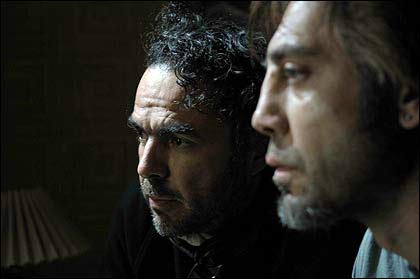
Life Sucks, And Then You Die
Biutifuls path too dusty and cluttered
by Molly Templeton
BIUTIFUL: Directed by Alejandro Gonzˆlez I¿ˆrritu. Written by Alejandro Gonzˆlez I¿ˆrritu, Armando Bo and Nicolˆs Giacobone. Cinematography, Rodrigo Prieto. Editor, Stephen Mirrione. Music, Gustavo Santaolalla. Starring Javier Bardem. Focus Features, 2010. R. 148 minutes.
 |
Trying to explain what happens in Biutiful is kind of like trying to explain the plot of an action film in which everything happens at once: You know, when the bad guys plan comes to fruition; the girl nearly drowns; the car breaks down; something explodes; planets collide; idiotic pilots fail to get out of the way of universe-destroying red matter ã but wait, theres more!
For Uxbal (Javier Bardem), however, the crises are slightly more realistic. Hes ill; his wife is a manic, selfish creature who comes in and out of his and their childrens lives; his brother is some sort of layabout and some sort of business partner; Uxbals job, as an outside-the-law facilitator who finds work for immigrants, is stressful and taxing at the best of times. And then theres the strange small matter of dealing with the corpse of a father Uxbal never knew.
Also, Uxbal can talk to dead people. Sort of. This sounds more dramatic than it is, in the film, and one of director and co-writer Alejandro Gonzˆlez I¿ˆrritus better choices is to play down this strange talent, to wrap it in as a reminder of the impossibility of tying up lifes loose ends.
Gonzˆlez I¿ˆrritu has made a career of sprawling stories that weave together seemingly disparate lives. His debut feature, Amores Perros, was arguably the most effective (and affecting) of the bunch, though Im fond of Babel (and not just for Rinko Kikuchis striking performance as a mute, aching teenager). Biutiful has one central character, which might make it seem more centered, but a cast of lightly sketched outlines rotates around Uxbal, spreading Biutifuls story and emotional weight too thin.
Bardems grounded, delicate performance nearly balances the overstuffed rest of the film, but I still found myself thinking, unexpectedly, of Bilbo Baggins, tired and worn, explaining that he felt “sort of stretched, like butter scraped over too much bread.” Such is Gonzˆlez I¿ˆrritus story, which spreads itself thin trying to tie Uxbals story to the stresses and failures of the global economy. Senegalese immigrants sell wares on the street; the cops claim theyre selling dope as well. Chinese immigrants sew purses for too little money and are locked in at night, sleeping on the sweatshop floor. Corrupt cops only turn a blind eye for so long.
Gonzˆlez I¿ˆrritus focus skips and stammers; he pauses for a bit on the sweatshop workers overseers, whose relationship never fully gels; he turns to Uxbals family, where his children are sweet and his wife is a caricature: overwrought, unstable, selfish, untrustworthy. Shes no more a full character than is the warm, gentle Ige (Diaryatou Daff), who Uxbal helps when her husband is deported.
If you can focus fully on Uxbal, and on the struggle embodied in Bardems posture, his lank hair and his drawn smile, youll find a smaller film lost in Biutifuls maze of threads. Its hard to see, hidden behind nebulous reminders that the world is messed up and unfair and good people do bad things sometimes. The morality of the film is neither simple nor complex; its undeveloped, like all the characters who are not Uxbal.
Biutifuls dedication is to Gonzˆlez I¿ˆrritus father, which makes sense, in a frustrating way: This crowded, distant mess plays out like a sentimental life lesson: Be better, be kind, mean well, forgive yourself for your worst failures and your children will love you despite them. Gonzˆlez I¿ˆrritus frequent cinematographer, Rodrigo Prieto, pries into the corners of damp apartments and dank alleys, filthy sweatshops and crowded funeral parlors, filling the screen with grit and longing and uncertainty, but weve seen all that before from this filmmaker, and to smarter ends. Rather than eliciting an emotional or thoughtful response, Biutiful calls up a feeling of obligation, as if we should feel moved, or shocked, or heartbroken about it. Maybe we should just watch Amores Perros again instead.